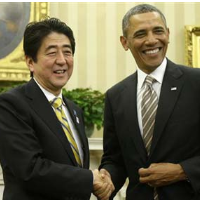Japanese Government Shoves through U.S.-Friendly Secrecy Law
 Shinzo Abe and Barack Obama (AP Photo)
Shinzo Abe and Barack Obama (AP Photo)
The Japanese government has approved a tough new secrecy law that could make Japan a stronger partner with the United States when it comes to intelligence sharing.
But many Japanese politicians, free speech advocates and academics have voiced serious concerns about the new law.
Prime Minister Shinzo Abe used his party’s majorities in both houses of parliament to push through the controversial legislation, which does the following:
- Authorizes heads of ministries and agencies to classify 23 types of information related to defense, diplomacy, counterintelligence and counterterrorism.
- Imposes stiffer penalties on government workers who leak secrets and journalists who receive them; bureaucrats face jail terms of up to 10 years now (up from one year), and reporters risk five-year sentences for violations of the law.
Criticism of the law was widespread, both inside and outside of Japan.
“It’s a bill of the bureaucrats, by the bureaucrats, for the bureaucrats to hide information,” opposition Democratic Party of Japan leader Banri Kaieda told parliament, according to The Wall Street Journal.
Morton Halperin, a senior adviser with the Open Society Foundations in New York who served in national security positions in three presidential administrations, said in a prepared statement: “This law is about as bad as any that a democratic government has considered in the 21st century. What is of equal concern is the speed at which it was enacted without extensive hearings or consultation with civil society and global experts.”
In Tokyo, a group of 31 academics, including two Nobel Prize winners, condemned the law as “the largest ever threat to democracy in postwar Japan.” Their statement was endorsed by an additional 3,150 academics.
According to the Associated Press, in “a government-sponsored ‘public comment’ process in September, 77 percent of about 90,000 comments opposed the bill, most of them expressing concerns about the possibility of their civil activities being curtailed.”
Two regional powers, China and South Korea, also expressed reservations about the law and what it might mean for Japan’s foreign relations.
“Japan has entered a course to change into ‘an ordinary nation,’” the South Korean Dong-A Ilbo newspaper published. “That means it is seeking to create a nation that can go to war by moving away from its postwar structure that banned war or the possession of a military.”
In a case of the pot calling the kettle black, the state-run China Central Television said in a report that the Japanese government’s strong-armed tactics used to adopt the law demonstrated the country is moving toward “becoming a military state.”
The reason the secrecy law is viewed as U.S.-friendly is that its “plugging [of] potential intelligence leak holes [is designed] to increase Japan’s credibility with its defense allies to gain a more integral role in the global intelligence community,” Toko Sekiguchi wrote for The Wall Street Journal. The U.S. government believes the law will strengthen Japan, thereby countering the military rise of China, according to the Associated Press. State Department spokeswoman Marie Harf said, “We welcome progress on strengthening policies, practices and procedures related to the protection of classified information.”
It will ultimately make Japan a “more effective alliance partner,” U.S. chargé d’affaires Kurt Tong said in a recent speech.
-Noel Brinkerhoff
To Learn More:
Japan’s Government Railroads Controversial Secrets Bill (by Toko Sekiguchi, Wall Street Journal)
China, South Korea Fear Secrets Law Could Lead To Japanese Military State (Asahi Shimbun)
Japan Secrecy Law Stirs Fear of Limits on Freedoms (by Mari Yamaguchi, Associated Press)
Japan's Secrecy Bill Condemned by Nobel Academics (Agence France-Presse)
- Top Stories
- Unusual News
- Where is the Money Going?
- Controversies
- U.S. and the World
- Appointments and Resignations
- Latest News
- Trump Orders ICE and Border Patrol to Kill More Protestors
- Trump Renames National Football League National Trump League
- Trump to Stop Deportations If…
- Trump Denounces World Series
- What If China Invaded the United States?






Comments